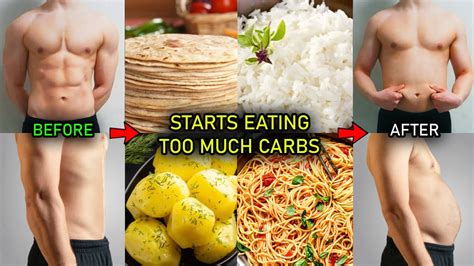What to Do After Eating Too Many Carbs
Eating too many carbs on the odd occasion is not the end of your healthy life. Here’s how to get over it without beating yourself up, and make wise carb choices.More

We've all been there – a carb-loaded feast that left us feeling like we might've overindulged just a tad. But fear not!
In this article, you'll learn the difference between complex carbohydrates (carbs that are good for you), simple carbohydrates (carbs that are not good for you), and what to do after eating too many simple carbohydrates.
Whether you got carried away with pasta, bread, or an entire pint of ice cream, and regardless of whether it was one meal or an entire long weekend of carb-binging, we've got your back. It can't be undone, so, let's tackle the post-carb munchies together and get back on the road to feeling awesome.
Signs of Having Eaten Too Many Carbs
If you've ever had too many tacos, pizza slices, or cookies, you likely know what the aftermath feels like. To make it even worse, that too-full, uncomfortable feeling often leads to negative emotions such as guilt and sometimes even shame.
Here are some tell-tale signs of a recent carb binge:
— Weight Gain: If you are in the habit of checking your weight every day, you’ll likely notice weight gain. But how can this be if carbohydrates contain the same calories per gram as protein (4), which is less than half the amount of calories per gram as fat (9)? Consuming more carbohydrates than your body needs for energy can contribute to weight gain. Excess carbs, especially simple sugars found in candy, ice cream, and other sweet treats, can be stored as fat in the body.
— Increased Hunger and Cravings: Certain types of carbs cause fluctuating blood sugar levels, resulting in increased hunger and cravings for more carbohydrates. This can create a cycle of overeating.
— Fatigue and Energy Swings: While carbohydrates are a primary energy source, consuming too many can lead to energy swings and fatigue, especially if they are rapidly absorbed, causing a spike and subsequent crash in blood sugar levels.
— Brain Fog and Poor Concentration: Fluctuations in blood sugar levels, which can occur when consuming too many carbs, may lead to feelings of brain fog, difficulty concentrating, and mood swings.
— Digestive Issues: Some carbohydrates, particularly those low in fiber, may contribute to digestive issues such as constipation or irregular bowel movements.
— Joint Pain: You may experience joint pain and inflammation, possibly related to the consumption of certain types of carbohydrates, especially those that may contribute to inflammation in the body.
While you might not be aware of it in the days after eating too many refined carbohydrates, making a habit of carb binging poses the following health risks:
— Insulin Resistance: Consuming too many carbs from refined sources can contribute to insulin resistance, which could impair the body's ability to regulate blood sugar levels effectively and is associated with an increased risk of type 2 diabetes.
— Increased Triglycerides: Frequent indulgence in refined carbohydrates and sugars can lead to elevated triglyceride levels, which is a risk factor for cardiovascular diseases.
What to Do After Eating Too Many Carbs
Before we focus on what to do after eating too many carbs, let's explore what NOT to do.
Don’t give up on yourself and don't beat yourself up for enjoying a carb-rich meal like pizza. Enjoy it and get right back on track. Make your next meal a healthy, satisfying one, eat what you want, and stop when you're full.
Don't skip your next meal or fast for days, and don't feel forced to detox. All of this is counterproductive. Your body needs food to produce energy to survive.
Here are some steps to recover and get back on track with your healthy eating habits:
1. Hydrate
Staying hydrated is essential for overall health and can also aid in digestion. Water can also reduce bloating and flush out excessive sodium consumed with your carb-rich meal. However, take care not to overdo it. Drinking plenty of water after your meal will only exacerbate your feeling of fullness. Sipping on 4 to 8 ounces of water after a large meal will do the trick if you stay hydrated for the remainder of the day.
2. Take a Walk
After eating too many carbs, any type of physical activity may feel like a tiresome chore. Be strong and go for a walk. You'll be surprised how light exercise, like walking, can help with both the physical and emotional discomfort that often follows a carbohydrate binge. A short walk can ease heartburn, gas pains, and any other gastrointestinal distress. It can also help regulate blood sugar.
3. Make Your Next Meal Wholesome
Eat carbs without added sugars and refined grains, such as white bread and sugary drinks that are high in calories but low in nutrition. Focus on consuming nutrient-dense, whole foods, striving for a balanced distribution of macronutrients. Include lean proteins, healthy fats, fiber-rich vegetables, and whole grains in your meals to provide essential nutrients, stabilize blood sugar levels, make you feel full, and prevent further cravings.
Remember, one occasional binge doesn't define your overall health or progress. It's essential to focus on long-term habits and make sustainable changes to support your well-being, but life should not feel like a never-ending punishment.
“Good” and “Bad” Carbs
Carbohydrates are an essential part of a healthy diet, and they provide many important nutrients. Although the terms “good” and “bad” carbs are often used to distinguish between carbohydrates that provide nutritional benefits and those that may have less nutritional value, it is not as simple as that.
Understanding the difference could help you choose your carbs wisely.
1. Complex Carbohydrates — Considered “Good” Carbs
Complex carbs, short for complex carbohydrates, are typically made up of long chains of sugar molecules that break down slowly in the digestive system. providing a steady source of energy. They are typically classified into two categories: starch and fiber. Complex carb intake can contribute to satiety and may help with weight management or even weight loss.
— Examples of Complex Carbs: Quinoa, beans, lentils, whole grain oats, berries, fruits, potatoes, sweet potatoes, whole grain bread, pumpkin, dates, and yogurt.
— Benefits: Complex carbohydrates provide sustained energy, are nutrient-dense, and offer gut health and other health benefits due to their fiber, vitamins, and minerals.
2. Simple Carbohydrates — Considered “Bad” Carbs
While simple carbs can provide a quick source of energy, they are often considered less nutritious than complex carbohydrates. They are quickly digested, leading to rapid spikes and crashes in blood sugar levels.
According to a 2019 Journal of the American Medical Association study, an average of 42 percent of daily calories come from low-quality carbohydrates.
— Examples of Simple Carbs:
Refined grains: White bread, pizza dough, white flour, white rice, white pasta, and pastries.
Processed and refined sugars: Candy, table sugar, syrups, and soft drinks.
— Concerns: Consuming too many simple carbs can lead to rapid spikes and crashes in blood sugar levels. They may contribute to weight gain, metabolic issues, and an increased risk of chronic diseases like type 2 diabetes and high blood pressure.
PRO TIP: You can still enjoy pasta and bread regularly if that is something you like to do. There are many pasta options made from garbanzo bean, lentil, and quinoa flour that allow to enjoy the foods you love without the guilt or insulin spike associated with traditional white flour options. Same goes for bread. This is why reading the ingredient labels is key.
Tips for Making Wise Carbohydrate Choices
Carbohydrates are an important part of a healthy diet and overall wellness because they are the body's primary source of fuel for energy and daily functions. The Dietary Guidelines for Americans recommend that carbohydrates make up 45% to 65% of total daily calories.
If managing your carb intake is too challenging, consult a registered dietitian or nutritionist to help keep you on track.
— Focus on Whole Foods: Choose whole, unprocessed foods such as whole grains, fruits, veggies, legumes, nuts, and seeds
— Prioritize Fiber: Go for high-fiber foods, as they can help regulate blood sugar levels, improve digestion, and contribute to a feeling of fullness.
— Limit Added Sugars: Minimize the intake of foods and beverages with added sugars, as they often provide empty calories without significant nutritional benefits. Avoid soda, baked treats, packaged cookies, fruit juice concentrate, breakfast cereal, and white bread.
Conclusion
So, there you have it, carb lovers! Eating too many carbs doesn't have to be the end of the world. We've dished out some practical tips to help you recover like a pro. Remember, it's not about perfection, but finding that balance that works for you. So, the next time you find yourself in a carb conundrum, hydrate, munch on whole foods, and maybe throw in a walk (or even a little dance party) for good measure.

 mainadmin
mainadmin 










